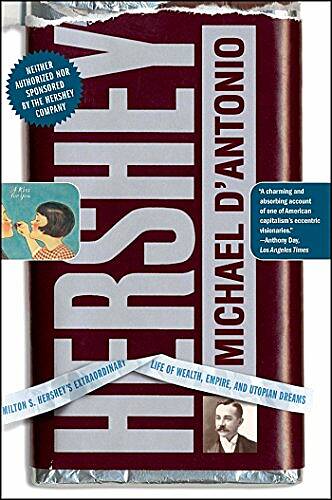
My highlights from the book:
1. The town of Hershey had been created first in the imagination of the chocolate industrialist Milton S. Hershey, who then made it real in a place where there had been little more than a few farmhouses and acres of corn. The chocolate factory, the school, and the town were supposed to make up a self-perpetuating little utopia of capitalism and charity, and all three had thrived for 99 years by adhering to his vision.
2. Though he possessed a strong will and could be imperious, Milton was often shy and sentimental.
3. Ambitious to a fault, he saw himself as a dramatic figure destined to do great things.
4. Rockefeller had arrived in Oil City in the same year as Henry Hershey (Milton’s father). But unlike Henry, he was possessed of extraordinary energy, remarkable financial savvy, and an uncanny ability to remain focused on his goals.
5. Henry had a preference for talking about things rather than doing them. Even neighbors could see that the man was lazy.
6. Milton also denied the kind of stability children need to feel secure. He had been moved from place to place, and he listened to his parents argue with increasing frequency and anger.
7. Milton went without proper shoes and the family didn’t have enough to eat. The pain of this life showed on his face. Neighbors saw Milton as an overly serious child.
8. (After leaving her husband) Fanny (Milton’s mother) would devote her time, energy, intellect, and labor to the only other male who might help her realize all her unexpressed ambition and pride: her son.
9. Milton soaked in his employer’s always-please-the-customer philosophy.
10. Things began to go awry as Milton faced intense competition from hundreds of other candy retailers and wholesalers in the city.
11. Money seems to disappear like magic with us.
12. Caught in the web of family animosities, and burdened with pressures of a failing business, Milton fell ill.
13. At 24, Milton Hershey had invested the first six years of his adult life in a business that failed. He had driven himself mercilessly, trying to prove he deserved the faith and financial backing he had received. He would have time to reflect on the experience.
14. He had learned a valuable lesson while working in a Colorado candy shop. The Denver recipes for caramels, which yielded a vastly superior candy, was not under any patent. It would be his advantage in a new business.
15. Hershey’s cough drops were supposed to tap the enormous winter market for sore throat lozenges. The problem was New Yorkers already had a favorite brand.
16. Smith Brothers Cough Drops were one of the first trademarked products in America. The eccentric bearded brothers developed an early method for mass production. The drops were made from batches of syrupy liquid that were boiled, cooled into a solid, and then cut. The cut pieces were then dumped into five-gallon milk pails. Wagons took the pails (this started in 1847) to homes, apartments, and farms, where families worked to put the drops in paper boxes. By manufacturing their product in a low cost area—a strategy Milton Hershey would one day copy — the Smith Brothers defeated all their competitors.
17. The Hershey’s were not able to mount a credible challenge to the Smiths. Milton closed shop.
18. Though he was only 28, the stress of two big failures made him look older.
19. If failure is the best instructor, he could argue that he had earned a doctorate.
20. Milton intended to make a candy no one else produced in the East — Denver style caramels.
21. I told Hershey to come back the next day. I walked the floor debating whether I would take the chance on the loan. He had told me all. He didn’t conceal the bad part. He made no excuses for it. He was honest. I decided I would lend him the money. But I was afraid to present to the bank that note with that story. To avoid trouble, I put my own name on the note.
22. After so much struggle it was strange that one big break — an order from an importer who happened to pass through town — who make Milton Hershey a success.
23. High quality and a fair price won Hershey repeat business.
24. Although competitors could battle Hershey on price, they couldn’t match his quality.
25. Milton Hershey visited Lehmann’s chocolate machines over and over again to study them in action. He recognized the superior technology on display and understood the commercial potential for European style chocolate in America.
26. Milton Hershey: The caramel business is a fad. It is not a staple business. But chocolate is something we will always have.
27. Milton plunged into the task for hours (learning how to make chocolate), and sometimes days on end.
28. My father suggested the manufacturer of Swiss Milk Chocolate in America. Hershey saw the importance of this idea at once.
29. Hershey had so many ideas that he often drove his helpers to exhaustion.
30. A group of eighteen men, led by Milton, would rise at 4:30AM to milk the herd of seventy-eight cows, eat breakfast, and then go to work behind a door where a sign warned “No Admittance.” Sometimes they didn’t come out until the next morning.
31. There remained one problem. Milton Hershey did not know how to mass produce milk chocolate.
32. The enormous success of Kisses and almond bars would lead Hershey toward a business strategy that was new to confectioners. Instead of making hundreds of items of varying prices, Milton would produce huge quantities of a few varieties and price non higher than a nickel.
Learn more ideas from history's greatest entrepreneurs by listening to Founders podcast. Read more highlights.